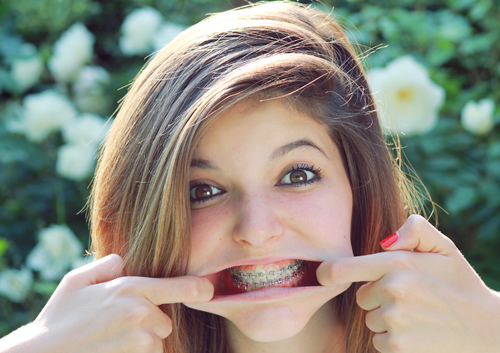
Orthodontic braces have been around for more than a century and have continually evolved over that time. Today’s braces are more discreet than ever, producing excellent results without being overly obvious during the corrective phase. If you are in search of an aesthetically appealing way of straightening your teeth, Dr. Chavez, Dr. Chase, Dr. Hughes, Dr. Barone, Dr. Taylor, Dr. Cohen, Dr. Woland, Dr. Alexander, Dr. Best and our team at Arch Orthodontics provide multiple options to choose from, including lingual braces and clear aligners.
Clear Aligners
Clear aligners are progressive-phase braces designed for patients who need mild-to-moderate correction of crowded or crooked teeth. This system includes a series of custom-made trays that gradually shift the teeth into their targeted positions. Instead of frequently returning to our Bridgewater, Brockton, Canton, Hyannis, Hyde Park, Orleans, and Randolph office to have braces tightened, you simply swap the trays out every few weeks. Clear aligners are virtually undetectable and can be removed while eating or brushing your teeth. When worn as prescribed, these metal-free trays can straighten your teeth in as little as six to 12 months.
Lingual Braces
Lingual braces are similar to traditional metal braces in that they are fixed to the teeth. However, lingual braces differ in that they are attached to back of the teeth rather than the front. This type of treatment is preferred over clear aligners among patients with moderate to severe orthodontic correction needs. Lingual braces are non-removable and must be adjusted periodically during scheduled orthodontic visits. However, lingual braces are capable of producing much more controlled force during treatment, which can yield highly successful results.
If you think you may be a candidate for braces, but aren’t sure whether lingual braces or clear aligners are right for you, Dr. Chavez, Dr. Chase, Dr. Hughes, Dr. Barone, Dr. Taylor, Dr. Cohen, Dr. Woland, Dr. Alexander, Dr. Best and our team can help you decide. Schedule a consultation today to find out more about your orthodontic options and start on the path to the beautiful, healthy smile you’ve always dreamed of.

Dr. Chavez, Dr. Chase, Dr. Hughes, Dr. Barone, Dr. Taylor, Dr. Cohen, Dr. Woland, Dr. Alexander, Dr. Best and our team get this question a lot. The word lingual means tongue, and lingual braces work in a similar fashion to regular braces, but with one important difference: Lingual braces are attached to the inside surfaces of the teeth facing the tongue, so they are practically invisible. Plus, they can align your teeth just as effectively as traditional braces. Treatment time with lingual braces at Arch Orthodontics is similar, too. Of course, each patient’s treatment time depends on his or her unique case.
What are the advantages of lingual braces?
Besides being completely invisible while straightening your teeth, lingual braces are just as efficient as clear aligners when it comes to complex movements such as correcting rotations, closing extraction spaces, or changing the height of your teeth. Plus, any discoloration or white spots that occur from wearing braces will be on the inside of your teeth. Lingual braces are also custom fit to each patient, which ensures a higher level of comfort.
If you have been considering orthodontic treatment, or would like to learn more about how lingual braces work, we encourage you to give us a call at our convenient Bridgewater, Brockton, Canton, Hyannis, Hyde Park, Orleans, and Randolph office. Dr. Chavez, Dr. Chase, Dr. Hughes, Dr. Barone, Dr. Taylor, Dr. Cohen, Dr. Woland, Dr. Alexander, Dr. Best and our team at Arch Orthodontics will be happy to answer all of your questions and help you determine if lingual braces are right for you.

By now, everyone knows that smoking is bad for you. But the truth is its broad-reaching health effects are not all known by everyone. This is especially true of oral health. Smoking can have serious repercussions in this regard. To give you a better idea of how smoking can affect your oral health, Dr. Chavez, Dr. Chase, Dr. Hughes, Dr. Barone, Dr. Taylor, Dr. Cohen, Dr. Woland, Dr. Alexander, Dr. Best and our team have listed some issues that can arise.
Oral Cancer
Oral cancer can have steep ramifications for anyone that gets it. Surgery can be required to eliminate the cancer before it spreads to more vital parts of your body. Any type of cancer is about the worst health effect you can get, and this especially holds true to the affects that smoking has on your mouth. The type of mouth surgery required with oral cancer can leave your face deconstructed in certain areas, and it is all due to smoking or use of other tobacco products.
Tooth Discoloration and Bad Breath
At the very least, it is fair to say that as a smoker you will often have bad breath, and while you may try to cover it up with gum or mints, tooth discoloration is a whole other story. The chemicals and substances in cigarettes stick to your teeth staining them brown and yellow colors that are increasingly difficult to disguise.
Gum Disease and Loss of Bone
Another effect of smoking is the increased risk of gum disease. Your gums may start to recede, which can eventually lead to the loss of teeth. Smoking can also increase bone loss and density in your jaw which is vital to the health of your mouth. Gum disease and bone loss are two signs that smoking is definitely bad for your mouth.
When it comes to the health of your mouth, the question is not whether smoking affects your health, it’s how does it affect your health and to what degree. If for no other reason than because smoking involves your mouth as its entry point, it is safe to say that it can have long-lasting and detrimental consequences on your oral health.
To learn more about smoking and your oral health, contact our Bridgewater, Brockton, Canton, Hyannis, Hyde Park, Orleans, and Randolph office to schedule an appointment with Dr. Chavez, Dr. Chase, Dr. Hughes, Dr. Barone, Dr. Taylor, Dr. Cohen, Dr. Woland, Dr. Alexander, Dr. Best.

The goal of orthodontic treatment at Arch Orthodontics, which may include the use of braces, retainers, and aligners, is to straighten your teeth. Treatment often starts in the pre-teen or teenage years, but adults may also need orthodontic treatment. The treatment can feel like a chore that lasts for several months or a couple of years, but it can fix important problems. These include:
Straight Teeth are More Attractive
You are more likely to be proud of your smile when your teeth are straight and evenly spaced. Pride in your appearance can give you more confidence and encourage you to try new things. This can be particularly important for adolescents. In addition, people often judge others based on first impressions. A smile that shows straight teeth is more attractive.
Better Oral Health is Easier
Brushing and flossing your teeth are two basic components of an oral health routine to protect your teeth from conditions such as tooth decay, gingivitis, and plaque build-up. As Dr. Chavez, Dr. Chase, Dr. Hughes, Dr. Barone, Dr. Taylor, Dr. Cohen, Dr. Woland, Dr. Alexander, Dr. Best and our staff know, caring for your mouth is easier when your teeth are straight. The American Dental Association says the following conditions are less likely to occur if you have the proper orthodontic treatment.
Orthodontic Treatment Improves Nutrition
Poorly aligned teeth can reduce your ability to chew properly or make certain foods more difficult to eat. Many of these more challenging foods are healthy, and avoiding them can cause you to limit your diet to softer, often less-nutritious foods, such as ice cream and canned soup. Straighter teeth and a better ability to chew let you eat crunchy foods, such as apples and carrots; stringy foods, such as asparagus and chicken; and chewy foods, such as raisins.